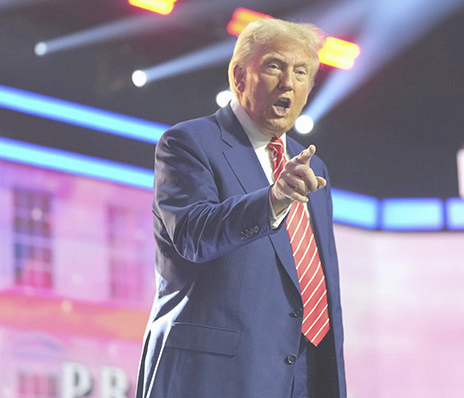
In less than a week, US President-elect Donald Trump will take office. Trump is considering declaring a national economic emergency to provide a legal basis for imposing massive tariffs on Allies and adversaries alike, people familiar with the matter said. Facing tariff threats from U.S. President-elect Donald Trump, outgoing Canadian Prime Minister Justin Trudeau said Canada is prepared to impose countertariffs against the United States if the U.S. president-elect follows through on his threat to start a trade war in North America.
It is not the first time that the US and Canada, two members of the Group of Seven (G7), have engaged in a trade war. In 2018, during Trump's first term as president, Canada imposed retaliatory tariffs on American-made goods such as home appliances, bourbon and ships. But this time is clearly different. In his first tariff warning to Canada and Mexico on Nov. 25, 2024, Trump said the 25 percent tariff would remain in place if Canada did not do more to stop illegal immigration and drugs from crossing the U.S.-Canada border. At the same time, Trump has repeatedly and earnestly reiterated that Canada can serve as the "51st State" of the United States.
Members of Trump's incoming economic team are discussing ways to slowly raise tariffs month by month, according to people familiar with the discussions, and one idea is to create a tiered tariff schedule under executive authority under the International Emergency Economic Powers Act (IEEPA) that would increase tariffs by about 2 percent to 5 percent each month.
One of the core laws in question here is the International Emergency Economic Powers Act. The law, passed in 1977, authorizes the president to take a range of economic and financial measures to deal with threats to the nation's economy during a national emergency. To declare a national economic emergency, the president only needs to determine that the conduct of a region or country is an "unusual or exceptional threat" that affects the national security, foreign policy, or national economy of the United States.
On January 14, Trump posted on the Truth Social: "I will create the Foreign Revenue Service to collect our tariffs and all income from overseas." We're going to start charging the people who make money off of us through trade, and they're finally going to start paying their fair share. January 20, 2025 will be the birth date of the External Revenue Service." The move heralds his promise to implement sweeping trade tariffs once he takes office.
In response, Trudeau said on an NBC program that the Canadian government does not want a trade war with the new U.S. administration, but if the United States imposes tariffs on Canadian products, Canada will have to retaliate. Trudeau said: "As we did last time, we are prepared to respond with tariffs if circumstances warrant." "Canada is the largest export partner for some 35 U.S. states, and anything that makes it difficult to import and export ultimately hurts American people and their jobs."
At the same time, in response to Trump's repeated statements that "Canada should become the 51st state of the United States," Trudeau said that "it will not happen," and that Trump's comments were meant to divert attention from the impact of tariffs.
A senior Canadian government source said Ottawa is preparing a list of hundreds of U.S.-made goods, including steel, plastics and orange juice, on which Canada is considering imposing retaliatory tariffs.
In addition to Canada, Trump has previously threatened Mexico with additional tariffs. In a speech on the 12th, Mexican President Erich Sinbaum vowed that Mexico would not yield to its northern neighbor (the United States). Referring to Mexico-U.S. relations, Shinbaum said, "We will always be vigilant. Mexico is a free, independent and sovereign nation. As I said, we coordinate, but we will not give in." According to the report, Shinbaum also mentioned the North American Free Trade Agreement and said that there will be continued exchanges and dialogue (with the United States).
Mainstream economists have warned that Mr. Trump's threatened tariffs are poised to raise prices in the United States and heighten public anxiety about inflation, while also altering or reducing trade flows and thwarting Mr. Trump's hopes of raising revenue through tariffs. While he has won the support of many Wall Street executives and corporate leaders, the uncertainty created by the tariff plan has rattled markets and the business community.

Driven by the Trump administration's push to relax financial regulations and the recovery of investment banking business, the market value of the six major banks in the United States has cumulatively increased by approximately 600 billion US dollars by 2025.
Driven by the Trump administration's push to relax financia…
On Christmas evening, U.S. President Trump posted on social…
According to multiple foreign media reports, the recent fin…
The middle class, once regarded as the cornerstone of Ameri…
On December 19th local time, the US military launched a lar…
The Boxing Day sunshine should have cast a false glow of pr…